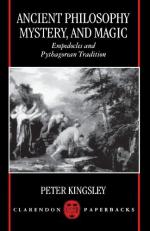|
This section contains 1,078 words (approx. 4 pages at 300 words per page) |

|
EMPEDOCLES of Acragas (Sicily), a Greek philosopher and sage who lived in the first half of the fifth century BCE (c. 495–435 BCE) and who ended his life, according to a widespread but apocryphal tradition, by jumping into the crater of the volcano Etna. The ancient biographical tradition made him a pupil both of Pythagoras and of Parmenides of Elea and ascribed to him several texts, among others a prose treatise titled "Medical Discourses" (Iatrikoi logoi), the hexametrical "On Nature" (Peri physeos), and "Purifications" (Katharmoi) (which has been preserved in fragments). Both sets of information reflect what the ancient tradition, from Aristotle onwards, already regarded as the somewhat disconcerting double character of Empedocles' work—the extant hexametrical fragments combine "modern" ontology and physics inspired by Parmenides with an anthropology and eschatology that derived in large part from Pythagoras's doctrine of reincarnation (groups of Pythagoreans were active in many places...
|
This section contains 1,078 words (approx. 4 pages at 300 words per page) |

|


